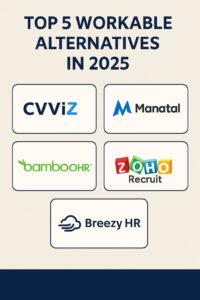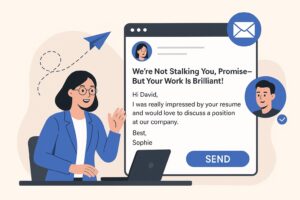You’re probably one of many who think, “Oh no, not another cover letter!.” But you shouldn’t be so quick to dismiss one. It might be what lands you the interview or potentially the job itself.
Even though some argue that cover letters might be dead, they do give you a chance to introduce yourself and help the recruiter paint a better picture of why you’d be a good fit for their company before meeting you in person, which is something resumes alone can’t do.
That said, let’s learn more about how cover letters help you stand out.
Understanding cover letters
The biggest problem with cover letters is that job seekers often don’t understand their true purpose. They think of them as an expanded version of their resumes when they’re, in fact, supposed to complement them and add a more personal touch to their applications.
Simply put, a resume focuses on your job experience relevant to the position you’re applying for, while a good example cover letter focuses on explaining how all this past work and skills you’ve gained make you the right fit for the job. It’s an extra effort but one that can set you apart.
Cover letters aren’t an expanded version of your resume. They’re not generic letters you write once and then send out to all companies you’re applying to. No, they’re not an afterthought you write just for the sake of it. Cover letters are a chance to tell your story from your point of view.
Why cover letters are important
Besides what many people think, yes, cover letters are still important. Mostly because they’re your opportunity to make a good first impression, and first impressions matter. Even if a recruiter doesn’t get to read your cover letter, they’ll still consider it a plus and value your effort.
You know what’s interesting? Most recruiters agree that cover letters aren’t strictly necessary, but 83% of them have also said they’re important for their hiring decisions, as they can secure you an interview even if your resume doesn’t meet their expectations.
So, what’s so special about cover letters?
Make applications more personal
The truth is companies won’t hire you just because of your extensive experience. Your personality also matters, and that’s exactly what your cover letter should focus on.
It gives you the chance to talk about:
- What makes you different from other candidates;
- Why you’re interested in working in the company;
- How motivated and enthusiastic you feel about the role.
But most of all, your cover letter allows you to tell your story while addressing the recruiter directly. What are some challenges you successfully overcame in your career? Is there a success story you’re especially proud of? You can talk about all of these achievements in detail, as well as how your personal values align with the company’s culture, making you the perfect fit.
This way, you’ll be creating a more personal connection with the recruiter, which maximizes your chances of securing the interview. Your words have much more power than you think, even in writing. This is why a well-crafted cover letter can make all the difference in your job search.

Provide context
Unlike your resume, which only lists your previous work experiences, your cover letter provides the recruiter with more context about them—HOW this experience and skills you’ve gained make you the right person for the job and WHY you’d like to work in this specific company.
Everyone can create a resume, especially with the many resume builders available. But not everyone can make the connection between their experience and the job at hand. This is why recruiters don’t ask and don’t expect direct questions in interviews. Instead, they want to see:
- Your problem-solving skills,
- Creativity, and
- Ability to think and act under pressure.
Your cover letter is where you get to showcase these qualities. You won’t just be talking about the dates and job titles from your previous positions but how all the work experience and skills you’ve gained helped you grow professionally and make you the ideal candidate for the job. You need to be as detailed as possible but, at the same time, straight to the point.
Cover letters also help you explain, in case you have employment gaps, why this happened and why you decided to change careers. I’m sure it won’t matter once you explain it, but otherwise, employment gaps you’re unable to explain can raise questions and concerns. Be careful, though, you don’t want to over-explain, as this can shift the focus to your insecurities.
Show that you’re willing to go the extra mile
Have you ever attended a class even though attendance wasn’t mandatory? If you did, then bravo! It takes a truly committed individual to go above and beyond what’s required.
This is the picture you want to paint for recruiters, and that’s how they’re going to perceive you after sending them a cover letter you weren’t required to send in the first place.
It shows them you’re willing to go the extra mile, as that’s how excited you are about the role. Not only that but doing so also sets you apart from other candidates.
What you need to remember is that even if the job posting states it’s optional, 72% of recruiters still expect candidates to include a cover letter in their application, while 63% are convinced that cover letters showcase the candidate’s motivation to work in the company.
Showcase your writing and communication abilities
You probably think that if you’re applying for an engineering position, your writing and communication abilities won’t matter. But that’s where you’re wrong. They might not be a priority, but they’re definitely skills that can give you a competitive edge over other candidates.
Well, your cover letter is the perfect way to showcase your writing and communication skills before you even meet the recruiter in person. Being able to clearly communicate your experience, personality, and motivation in writing will potentially get you that interview, which is why you should never overlook the importance of cover letters.
Express your enthusiasm for the job
Yes, I understand that money is possibly every candidate’s interest, but there’s a difference between working only to pay the bills and doing the job you love while getting to pay the bills.
When you’re enthusiastic about a role, it shows. Enthusiasm is a difficult feeling to fake, which is why recruiters are unlikely to overlook your application if you manage to express your enthusiasm. It means your cover letter is genuine. As Norman Vincent Peale once said,
“Enthusiasm releases the drive to carry you over obstacles and adds significance to all you do.”

How to write the perfect cover letter
I don’t want to focus on formalities as much because you can find plenty of cover letter samples on the internet to demonstrate this. Instead, I want to talk more about what you need to include in your cover letter regarding context and the tone you need to maintain throughout.
- Grab the recruiter’s attention: Instead of opening with “Hi, my name is…”, start by explaining how the job posting got your attention and how you connect to the role.
- Talk about past achievements: Don’t just go over your work experience chronologically, but rather mention an achievement you’re proud of or how you’ve helped some of your previous companies overcome a significant challenge.
- Align your skills with the company’s needs: Listing your skills one after another won’t do much. You want to elaborate on how these skills are relevant to the company’s needs.
- Go with a conversational tone: I’m not saying that you should include slang, but write in a more personal way. No one appreciates generic writing anymore.
You can go into detail as much as necessary, but your cover letter should be no longer than two pages. Your best bet is to make it one page long to ensure the recruiter reads it all.
As per recent research, companies prefer that you first introduce yourself in the email and then add both your cover letter and resume in separate attachments. They also want you to customize your cover letter depending on the company and job position you’re applying for.
Sealing the deal
You’ll see many comments about how cover letters are no longer relevant, but at the end of the day, the way you go about your application is your personal choice. If you feel like your resume isn’t enough to showcase your personality and skills, then why not add a cover letter as well?
As we’ve discussed, there’s not an employer that won’t value the extra effort, so you might as well roll up your sleeves and start typing. You could finally land that interview and get the job!




